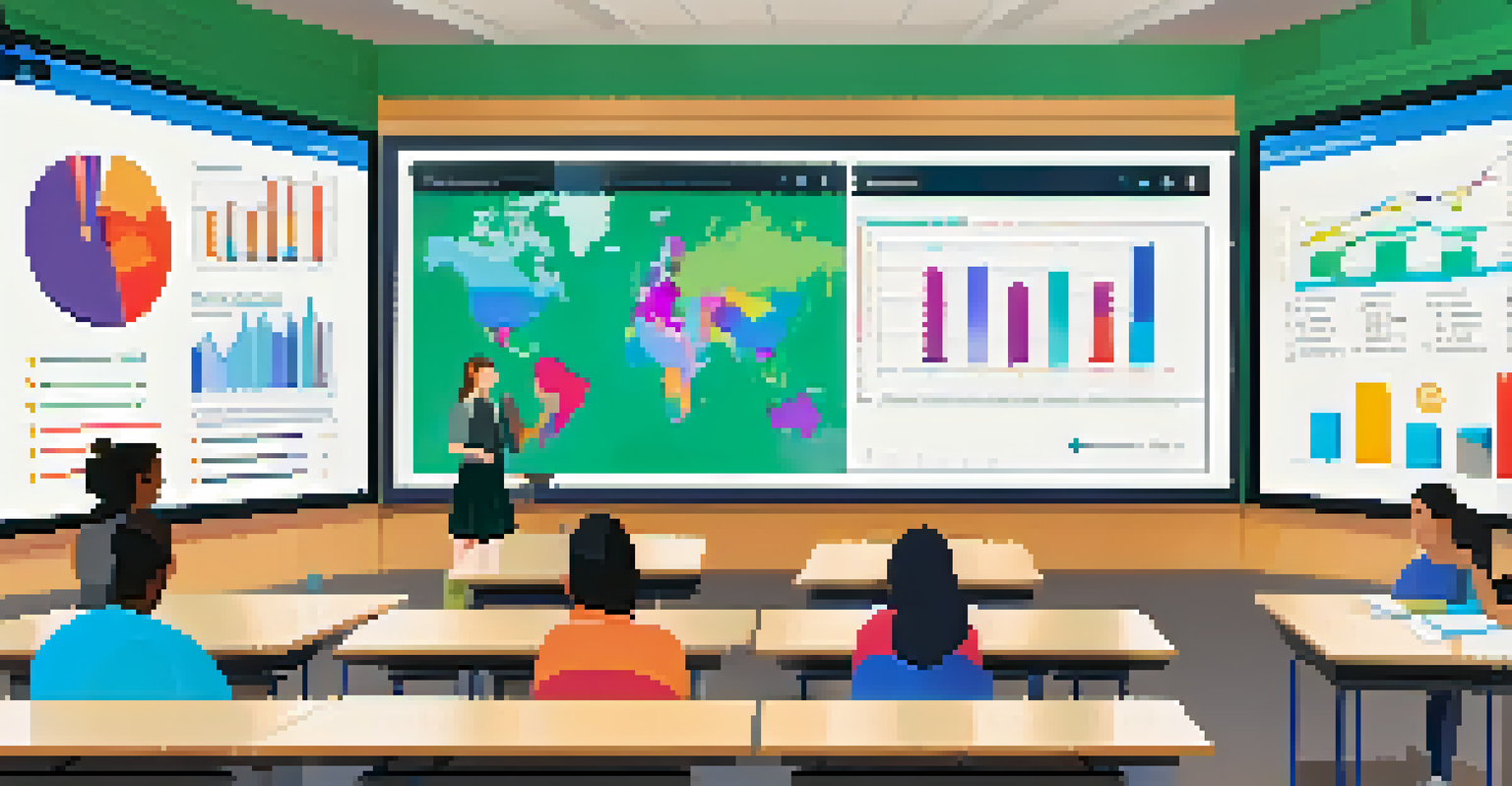Education and Artificial Intelligence: A Transformative Duo

Understanding Artificial Intelligence in Education
Artificial Intelligence (AI) refers to computer systems designed to perform tasks typically requiring human intelligence, such as learning and problem-solving. In education, this technology is being harnessed to create personalized learning experiences that cater to individual student needs. For instance, AI can analyze a student's learning patterns and suggest resources that could help them understand a concept better.
Artificial Intelligence is the new electricity.
The integration of AI into educational settings also allows for the automation of administrative tasks, freeing up educators to focus on teaching. Imagine a world where grading is done automatically, and teachers can spend more time engaging with students. This not only enhances the educational experience but also improves the efficiency of educational institutions.
AI tools can range from intelligent tutoring systems that provide real-time feedback to chatbots that assist students with questions. By leveraging these technologies, students can receive support whenever they need it, making learning more accessible and effective.
Personalized Learning Through AI
One of the most exciting prospects of AI in education is its ability to offer personalized learning paths. Just like a tailor-made suit fits perfectly, AI systems can adapt educational content to fit each student’s unique learning pace and style. This means that students who grasp concepts quickly can move ahead, while those who need more time can slow down without feeling pressured.

For example, platforms like DreamBox Learning use AI algorithms to adjust math lessons in real-time based on student performance. This not only keeps students engaged but also helps them build confidence in their abilities. By addressing individual strengths and weaknesses, AI makes learning more effective and enjoyable.
Personalized Learning with AI
AI tailors educational content to individual students, enhancing engagement and effectiveness.
Personalized learning powered by AI also extends beyond academics. It can help identify students' interests, guiding them toward subjects and career paths that resonate with them. This approach fosters a love for learning, making education not just a requirement but a passion.
AI-Driven Assessment Tools for Educators
AI is revolutionizing the way educators assess student performance. Traditional assessments often rely on standardized tests that may not accurately reflect a student's abilities or knowledge. With AI-driven assessment tools, teachers can obtain a comprehensive view of each student's strengths and areas for improvement.
The great aim of education is not knowledge but action.
For instance, platforms like Gradescope utilize AI to assist teachers in grading assignments more efficiently and consistently. By automating parts of the grading process, educators can focus on offering constructive feedback rather than simply assigning scores. This shift not only saves time but enhances the quality of education.
Moreover, these AI tools can provide insights into class performance trends, allowing educators to tailor their teaching strategies accordingly. For example, if a majority of students struggle with a particular topic, teachers can revisit that lesson, ensuring that all students have the chance to succeed.
Enhancing Teacher-Student Interaction
AI's role in education extends to improving the interaction between teachers and students. By utilizing AI chatbots, students can ask questions and receive instant feedback outside of classroom hours. This capability breaks down barriers, making learning more accessible and fostering a collaborative environment.
Moreover, AI can help educators identify which students may need additional support. By analyzing data on student interactions and performance, AI systems can flag those who are struggling, allowing teachers to intervene before issues escalate. This proactive approach can significantly enhance student success rates.
AI Enhances Teacher Assessments
AI-driven tools provide comprehensive insights into student performance, enabling better educational strategies.
Additionally, AI tools can facilitate more meaningful discussions in the classroom by providing teachers with insights into students’ interests and comprehension levels. This enables educators to tailor discussions and activities that resonate with students, making learning more relevant and engaging.
AI in Special Education: Tailored Support
Artificial Intelligence is making significant strides in special education, offering tailored support for students with diverse learning needs. Tools like speech recognition and text-to-speech technology help students who might struggle with traditional learning methods. For instance, a student with dyslexia can benefit from AI-driven applications that read text aloud, making it easier for them to engage with materials.
Moreover, AI can adapt resources to fit various learning challenges, providing a customized experience for each student. This means that students with autism can use AI tools designed to improve social skills through interactive simulations, allowing them to practice real-world scenarios in a safe environment.
By integrating AI into special education, we’re not just enhancing academic outcomes; we're also fostering independence and confidence among students. With the right support, every student can reach their potential, transforming challenges into opportunities for growth.
Preparing Students for Future Careers
As the job market evolves, it's crucial for education systems to prepare students for future careers. AI plays a pivotal role in this transition by equipping students with the skills they need to thrive in a tech-driven world. From coding to data analysis, integrating AI into the curriculum helps students become familiar with the tools they’ll encounter in their professional lives.
For instance, platforms like Code.org offer AI-driven courses that teach students programming skills while adapting to their learning styles. This not only prepares them for future job opportunities but also encourages critical thinking and problem-solving abilities, essential skills in any field.
AI Supports Diverse Learning Needs
AI technologies offer customized support for students with special needs, fostering independence and confidence.
Additionally, AI can provide insights into job market trends, helping educators align their curricula with the skills employers seek. By staying ahead of the curve, schools can ensure that students graduate with relevant skills, paving the way for their success in the workforce.
Challenges and Considerations of AI in Education
While the benefits of AI in education are plentiful, it's essential to consider the challenges that come with it. One primary concern is data privacy. As AI systems collect and analyze student data, it’s crucial to ensure that this information is protected and used ethically. Parents and educators must be aware of how data is being managed to maintain trust.
Another challenge is the potential for over-reliance on technology. While AI can provide valuable insights and support, it’s important to remember that education is fundamentally a human endeavor. Striking a balance between AI tools and traditional teaching methods is essential to preserve the essential human elements of learning.

Moreover, there’s a risk that not all schools have equal access to AI resources, potentially widening the educational gap. To address this, stakeholders must work together to create equitable solutions ensuring all students benefit from AI advancements, regardless of their socioeconomic background.